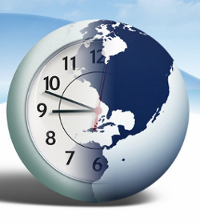 There were so many hopes centered on Copenhagen this week. For some it seemed that an effective, positive deal might actually come to fruition. However, for many others, it was an impossible dream that was doomed before it even started due in large part to the failing records of many large industrialized nations such as Canada and the United States. Still, there is one factor that both sides have failed to factor into the equation which I think is a major contributor to the fundamental failure of the Copenhagen talks and most, if not all of those to come. Some of the traditional holdouts and troublemakers want global warming to continue into the foreseeable future, feeling that there is a profit to made in it.
There were so many hopes centered on Copenhagen this week. For some it seemed that an effective, positive deal might actually come to fruition. However, for many others, it was an impossible dream that was doomed before it even started due in large part to the failing records of many large industrialized nations such as Canada and the United States. Still, there is one factor that both sides have failed to factor into the equation which I think is a major contributor to the fundamental failure of the Copenhagen talks and most, if not all of those to come. Some of the traditional holdouts and troublemakers want global warming to continue into the foreseeable future, feeling that there is a profit to made in it.
It is no coincidence that some of the more steadfast holdouts for effective change policies are from the Northern Hemisphere, as the economics of climate change are far more insidious than simply protecting existing dirty industries. In fact, northern politicians and capitalists are looking forward to many of the offshoots that they feel will be economically beneficial from rising global temperatures. For Canada, the United States and Russia, the rapidly deicing Northwest Passage is already a hot issue as these nations struggle to gain control of any future shipping that will begin moving through the region in coming years. The possibility of utilizing a Northwestern Passage through the arctic has been tantalizing for hundreds of years, at least since explorers realized that North and South America stood between Asia and Europe. An open passage here would dramatically reduce shipping times and operational costs in East-West trade and allow the total bypass for many nations of the Panama Canal, a possibility that many Western capitalists relish regardless of the cost paid by the rest of the world for climate change.
There is also an economic boon to be gained from global warming that includes future profits for the traditionally dirty industries such as mining and fossil fuels. As the previously frozen tundra, ice covered waters, and glacial covered lands thaw, they will become accessible to the further exploitation not possible in the past. This includes much of Canada’s north, Alaska, Russia’s north, Greenland and other regions that have long been thought rich in minerals and fossil fuels, but far to expensive to exploit at a profit.
But these industries are not the only ones that could benefit. As increasing global temperatures will open the northern landscape, there is also the possibility to expand agricultural territory and lengthen the growing seasons in some of the more northern agricultural nations. Tourism could also be impacted positively as the North becomes far more temperate and therefore accessible to a new breed of tourist, not just seasonal adventurers but a more traditional group of travellers interested in the greatest new destination.
With so many varying industries and interests seeing present and future profit in climate change, it is no wonder that nations such as Canada with northern territories are reluctant to produce any real substantive change in their emissions policies. So in an effort to protect these profit interests, they concentrate their efforts on protecting their current destructive policies with one eye toward future profits. With so many industries looking to gain from global warming, it is not hard to understand the disruptive and destructive approach of many nations such as Canada and the United States to the Copenhagen process.
Related Links Richard Ingham, “Climate deal meets furious reception,” Agence France-Presse (AFP), http://www.google.com/hostednews/afp/article/ALeqM5jmJETxZwV2JFB49zmEvTgHgfw4kA (December 19, 2009)Suzanne Goldenberg, “Obama emerges from climate talks with slender pact and bruised stature,” guardian.co.uk, http://www.guardian.co.uk/environment/2009/dec/19/barack-obama-copenhagen-climate-change-us (December 19, 2009)
Christina Spencer, “Canada ‘very comfortable’ with climate-change deal,” Toronto Sun, http://www.torontosun.com/news/canada/2009/12/18/12207171-qmi.html (December 18, 2009)
Michael Szabo, “Canada says must go in tandem with U.S. on climate,” Reuters Canada, http://ca.reuters.com/article/domesticNews/idCATRE5BH54J20091219 (December 18, 2009)
The Canadian Press, “Tighten Arctic security and shipping, Senate urges” The Toronto Star, http://www.thestar.com/news/canada/article/738550–tighten-arctic-security-and-shipping-senate-urges (December 14, 2009)
Randy Boswell, “Arctic sea route to be renamed ‘Canadian Northwest Passage’” The Vancouver Sun, http://www.vancouversun.com/news/Arctic+route+renamed+Canadian+Northwest+Passage/2300092/story.html (December 3, 2009)
Karl Ritter, “In Greenland, warming fuels dream of hidden wealth,” The Associated Press, http://www.google.com/hostednews/ap/article/ALeqM5imQS-V-ibjVp3bpZy0uHoKQmcUWQD9C7QTAG0 (November 27, 2009)
No comments:
Post a Comment